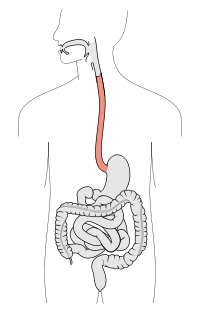
Photo from wikipedia
Eosinophilic esophagitis (EoE) is a chronic allergic disease defined by a marked eosinophilic inflammation and symptoms of esophageal dysfunction. EoE is a heterogeneous disease and severely impacts the quality of… Click to show full abstract
Eosinophilic esophagitis (EoE) is a chronic allergic disease defined by a marked eosinophilic inflammation and symptoms of esophageal dysfunction. EoE is a heterogeneous disease and severely impacts the quality of life of affected patients. The current therapeutic management of EoE is based on two cornerstones: medication and diet therapy, both effective but limited by several critical issues. The choice of one or the other therapy might depend on the different disease phenotypes (allergic vs. non-allergic, inflammatory vs. fibro-stenotic), patient's age (adult vs. childhood-onset), food habits, patient/family preference, and familiar financial resource. Diet therapy is a successful treatment but limited by low patient adherence, the need for several endoscopies, food restrictions, psychosocial impact, and potential nutritional deficiencies. All these limitations could be effectively overcome with multidisciplinary and personalized management. This review summarizes the most recent evidence on the dietary elimination approaches and will provide a practical guide to clinicians in managing and implementing dietary therapy for patients with EoE.
Journal Title: Frontiers in Pediatrics
Year Published: 2022
Link to full text (if available)
Share on Social Media: Sign Up to like & get
recommendations!